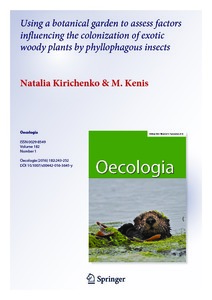Using a botanical garden to assess factors influencing the colonization of exotic woody plants by phyllophagous insects
URI (для ссылок/цитирований):
https://elib.sfu-kras.ru/handle/2311/33121Автор:
Kirichenko, N.
Kenis, M.
Коллективный автор:
Научно-исследовательская часть
Дата:
2016Журнал:
OecologiaКвартиль журнала в Scopus:
Q1Квартиль журнала в Web of Science:
Q2Библиографическое описание:
Kirichenko, N. Using a botanical garden to assess factors influencing the colonization of exotic woody plants by phyllophagous insects [Текст] / N. Kirichenko, M. Kenis // Oecologia. — 2016. — Т. 182 (№ 1). — С. 243-252Текст статьи не публикуется в открытом доступе в соответствии с политикой журнала.
Аннотация:
The adoption of exotic plants by indigenous herbivores in the region of introduction can be influenced by numerous factors. A botanical garden in Western Siberia was used to test various hypotheses on the adaptation of indigenous phyllophagous insects to exotic plants invasions, focusing on two feeding guilds, external leaf chewers and leaf miners. A total of 150 indigenous and exotic woody plant species were surveyed for insect damage, abundance and species richness. First, exotic woody plants were much less damaged by chewers and leaf miners than native plants, and the leaf miners’ species richness was much lower on exotic than native plants. Second, exotic woody plants having a congeneric species in the region of introduction were more damaged by chewers and hosted a more abundant and species-rich community of leaf miners than plants without native congeneric species. Third, damage by chewers significantly increased with the frequency of planting of exotic host plants outside the botanical garden, and leaf miners’ abundance and species richness significantly increased with residence time in the garden. Finally, no significant relationship was found between insect damage or abundance and the origin of the exotic plants. Besides the ecological implications of the results, this study also illustrates the potential of botanical gardens to test ecological hypotheses on biological invasions and insect–plant interactions on a large set of plant species.

